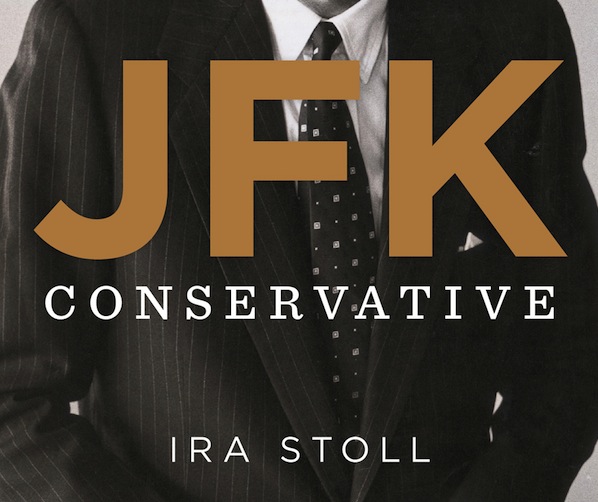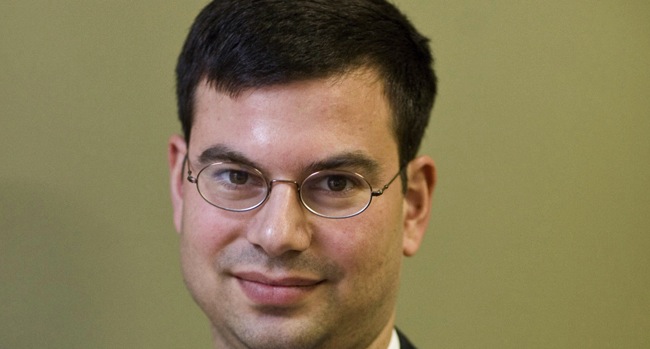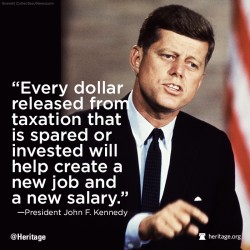Book Interview: JFK, A Conservative?
In his book, Ira Stoll argues that John F. Kennedy was, “by the standards of both his time and our own, a conservative.”
JFK, Conservative by Ira Stoll. Houghton Mifflin Harcourt, 288 pages, $27.
By Blake Maddux
For the past several decades, the name Kennedy has been inextricably linked with post-World War II American liberalism.
The family’s current political reputation was built during youngest brother Edward M. (“Ted”) Kennedy’s tenure in the U.S. Senate. Taking office six years prior to his brother Robert’s 1968 assassination, Ted became known as the “liberal lion” of Congress’s upper chamber, devoting his career to progressive causes such as civil rights and universal health care.
However, John F. Kennedy, the highest-achieving officeholder of the family, was a very different political animal from his youngest brother. According to Ira Stoll, Kennedy was “by the standards of both his time and our own, a conservative.”
Stoll — a Worcester native, Harvard graduate, Samuel Adams biographer, and publisher of FutureofCapitalism.com — recently spoke to me by phone about his new book, JFK, Conservative.
Arts Fuse: What inspired you to go from writing about Samuel Adams — who died in 1803 — to writing about John F. Kennedy, who was born in 1917?
Ira Stoll: Even though there is a time difference, there is a lot of similarity. Kennedy and Adams both went to Harvard. They were both quite religious. They both believed in fighting for freedom. Samuel Adams was a tax rebel and JFK, in his own way, also rebelled against taxes that were too high. So I think they actually had quite a bit in common. And they were both from Massachusetts.
AF: When did it first occur to you that JFK was more conservative that conventional wisdom would have us believe?
Stoll: I knew that the 50th anniversary of Kennedy’s death was coming up, and that there is a lot of interest in him. The more I started to look into it, the more I found. It’s hard to escape Kennedy growing up in Massachusetts. My parents took me to the Kennedy Library, and I went with my high school history club, and I think I went with the Boy Scouts. The Harvard Crimson had an anniversary dinner at the Kennedy Library. I had done some reading on the topic, but I didn’t really dive in deeply until I started working on this book.
AF: At one point you write, “Particularly as 1960 approached and Kennedy sensed the political need to court the Democratic Party’s liberal wing, his voting record became more similar to that of potential rivals such as Hubert Humphrey.” At another point you write, “he backed away from his efforts as a congressman to promote government aid to parochial schools.” In other words, JFK was willing to pander. Therefore, might his public professions of his religious devotion — the authenticity of which you are particularly keen on stressing —actually have been, in your words, “just rhetoric” from a politician, “hypocritical” or otherwise?
Stoll: To me, some of the giveaways are the fact that he interrupted his weekend off the coast of Maine to go to mass on Sunday when really there was not a lot of press around. Nobody would have really noticed it, and would have understood if he was on a boat and on some island in Maine. He didn’t really need to stop and go to church.
Or the guy who said that he [Kennedy] skipped bacon in his breakfast on Fridays. And the fact that during the Cuban Missile Crisis, when the press wasn’t following him around, he ducked into churches in Washington to pray. Or even that quote from Barbara Sinatra about how he visited Palm Springs and in between chasing all the women he was constantly running off to mass to pray for his family.
Those seem to me to be the acts of a private, faithful Catholic. And I argue in the book that it spilled over into his public policy, where he talked about the Soviet Union as a godless, atheistic threat, and the Cold War as a war between good and evil.
AF: Did liberal elected officials in JFK’s time not talk openly of religion or speak anything other than critically of communism?
Stoll: There was a broad bipartisan consensus against communism, but Kennedy’s anti-communism was, in some cases, exceptional for his party. He criticized President Truman, who was a Democrat, for losing China to the Communists, and he voted with Barry Goldwater on trade sanctions against countries that do business with Communist China. On some of those votes, the Democrats — and even some liberal Republicans — were on the other side.
I think there can be religious liberals, both at that time and today. But for the policy reasons that I talk about, he was a conservative. He wanted to cut taxes. He was quite restrained when it came to government spending. He wanted to increase military spending. He was very hard-line against the Communists. He was critical of welfare, he thought that tax cuts could generate growth, and he was for cutting taxes not just for the poor and the middle class, but also for the rich and on capital gains and on businesses.
Those are things that people now characterize as conservative. Kennedy himself, in one interview said, “I’m not a liberal.”
AF: Although you do not mention it, Ronald Reagan said of JFK in 1960, “Under the tousled boyish haircut it is still old Karl Marx.” National Review, as you write, described JFK a being dedicated to “doctrinaire liberalism.” Senator Barry Goldwater (“Mr. Conservative”) was the one vote in the Senate against the 1959 Kennedy-Ervin bill, and he opposed President Kennedy’s tax cut. Why were these three conservative pillars so uncharitable toward JFK if he was one of their own?
Stoll: Reagan and Goldwater really came around on that point. I quote Reagan extensively toward the end of the book, praising Kennedy and associating himself with Kennedy on taxes and the military build-up. Reagan was arguing that he was governing in the style of Kennedy. With the passage of time, Reagan really realized that Kennedy was to be admired in a lot of ways.
Goldwater, too, I quote in the book as admitting that he had been wrong about Kennedy’s tax cuts.
AF: Surely JFK must have displayed some liberal tendencies.
Stoll: Kennedy gave a speech or two in favor of Medicare, which he didn’t really fight for, and liberals were mad at him for not fighting for it. I think that the conservatives at the time wanted him to be more aggressive against communism than he even was. They wanted him to nuke Cuba, or invade Cuba, rather than just blockading it and getting the missiles out. I think, in retrospect, that that seems a little extreme.
AF: As a senator, JFK opposed a constitutional amendment lowering the voting age to 18 and, as both senator and president, he made civil rights one of his lower priorities. Irrespective of whether these were the conservative things to do, were they the right things to do?
Stoll: On the voting age, I could see all sides of that. On one hand, I’ve argued for lowering the voting age to 0, so that we don’t keep running up the national debt and raising benefits for Social Security in a way that saddles the people who can’t vote yet with the bills of our current seniors.
On civil rights, I think that I am pretty clear in the book that Kennedy’s record was mixed. Obviously, there was a need for vigorous federal action to advance integration. I think Kennedy did that when it came down to it, in some of southern universities and with some of his judicial appointments. Putting Thurgood Marshall on the Second Circuit Court of Appeals was a great move.
But he was slow to introduce major civil rights legislation, and I think he wanted to put the priority on the tax cut because he thought a strong economy would help minorities more than civil rights legislation would. Kennedy may have be right to be a little bit humble about what could be accomplished with legislation.
AF: Would liberals have gotten more of what they wanted had Richard Nixon been elected in 1960?
Stoll: You can make the sort of flip-side of the JFK, Conservative argument that Nixon was a liberal. I think that there’s a lot of truth to that. It’s hard to tell how much of that was trying to win over the center versus how much was Nixon’s core convictions. Had he been elected in 1960, I think it’s unlikely that he would have done Medicare, the War on Poverty, and all the government spending that [President Lyndon] Johnson did.
AF: How do your fellow conservatives feel about welcoming John F. Kennedy to the club?
Stoll: JFK, Conservative has gotten a lot of positive attention from the conservative press, but I think on some level that there’s still some resistance. I’m hoping this book breaks through it.
The book got a very nice review in National Review. It got a nice review in The Weekly Standard and in Commentary. Rush Limbaugh talked about it on the air and on his show. So I think there’s an openness to the idea.
Blake Maddux is a freelance journalist and regular contributor to DigBoston and The Somerville Times. He recently received a master’s degree from Harvard Extension School, which awarded him the Dean’s Thesis Prize in Journalism. A native Ohioan, he moved to Boston in 2002 and currently lives with his wife in Salem, Massachusetts. He will be teaching a class during the winter term on the First Amendment in American History at the Cambridge Center for Adult Education in Cambridge, MA.




Ted Cruz would not be recognized by any conservative of the Kennedy era. Kennedy was a pragmatist; and he was capable of learning and basing that learning on empirical data.
That makes him a no-fit for the neocons, with their Iraq War contempt for “the reality community.”